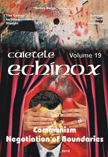La dénonciation du communisme en Union Soviétique et en France par des intellectuels est- et centre-européens d’expression française
Exposure of the Communist Regime in Soviet Union and France
Author(s): Alain VuilleminSubject(s): Literary Texts
Published by: Universitatea Babeş-Bolyai
Keywords: Soviet Union; Communism; Exposure of the Communist Regime; Ante Ciliga; Panaït Istrati; Victor Serge; Boris Souvarine.
Summary/Abstract: The exposure in France of the crisis of the communist regime in the Soviet Union started very early. In 1927, upon the tenth anniversary of the Bolchevic Revolution, Panaït Istrati whose reputation had by then already grown in France with the publication in 1924 of Kyra Kyralina, received an invitation from Soviet officials to attend the commemorating festivities in Moscow. The writer departs for Russia in October 1927 and will only return to Paris in February 1929. Growing out of his Russian experience is a three-volume tome entitled Vers l’autre flamme. Confession pour vaincus which was to come out on October 15th 1929. Istrati was to author the first volume alone, Après seize mois dans l’U.R.S.S.. The second would be written by Victor Serge, a Belgian journalist of Russian origin, arrested and imprisoned in Leningrad, in April 1928, while Istrati was still in Russia, and the third, La Russie nue, by Boris Souvarine, a naturalized French journalist of Ukrainian origin who had lived in Moscow between 1921 and 1925. The book thus marks the first denunciation of Stalinism to appear in France and be authored in French by writers from Central and Eastern Europe. Several years on, a fellow intellectual by the name of Ante Ciliga was to be arrested on 21 May 1930 by the Stalinist police and deported to Siberia, only to spend the period 1933-35 in hard labour. Ciliga was an Austro-Hungarian born in Croatia and naturalised in Italy in 1919, who left Yougoslavia and went into exile in Moscow in 1926. Ciliga was to be expelled from the Soviet Union in 1935. Taking refuge in France, he publishes in Paris a no less shattering anti-Stalinist testimonial, an account of his exile and deportation entitled Au pays du grand mensonge. For all their poignancy, books such as the above have however fallen into oblivion. Probing great foresight, they formulate an insightful and acerbic critique of what Stalinism and communist had already become in the Russia of 1927. In the following, we seek to remember these testimonials and what they reveal about Stalinist practice in the former Soviet Union in an age marked by the betrayal of revolutionary ideas, a crashing oppression exerted by a sprawling bureaucratic apparatus, and the predicament of the Russian masses and their dreary condition.
Journal: Caietele Echinox
- Issue Year: 2010
- Issue No: 19
- Page Range: 155-161
- Page Count: 7
- Language: French
- Content File-PDF

